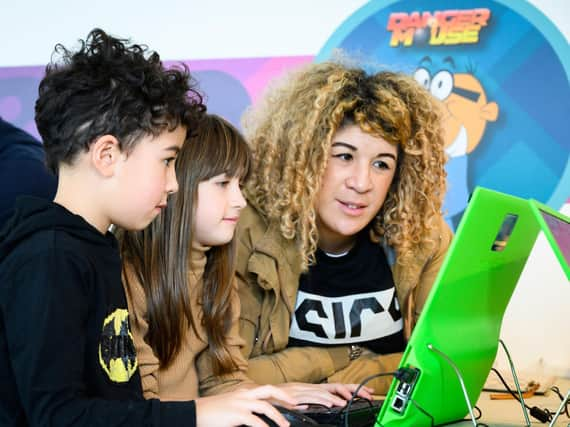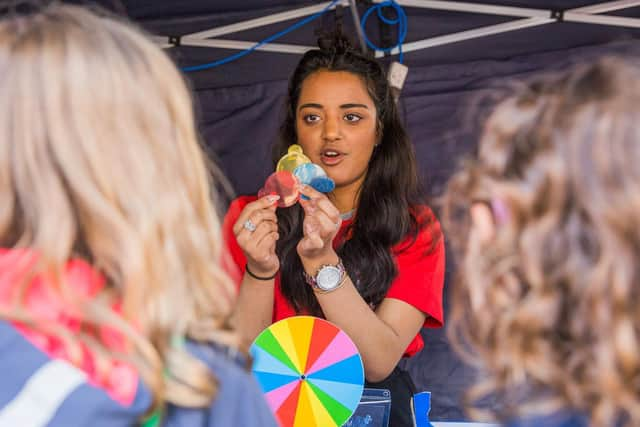Human and environmental consequences of electronic waste to be highlighted as part of Bradford Science Festival


“It’s quite startling when you see images of kids sitting on these electronic waste dumps with all our electrical Christmas and Halloween tat that lasts for five minutes and then is skipped,” he says.
Through Calderdale-based company Scavenger Labs, Stephen aims to raise awareness of the issue. He is encouraging people to learn more about technology and is hoping to spread the message that there is value in e-waste and that it can be re-used.
Advertisement
Hide AdAdvertisement
Hide AdNext week, he is running a stage show, 50 Millions Tonnes, as part of Bradford Science Festival. Targeted at people aged seven and over, and exploring e-waste and upcycling, it will look at what is inside everyday electronic items, where the materials typically end up after being thrown away - and the human and environmental consequences of that, and what can be done with old tech.


“50 million tonnes is roughly how much electronic waste is produced every year,” Stephen says. “The statistic for last year was 53.6 million tonnes globally. Plastic waste has received so much attention which is great, there’s been lots more awareness of that issue.
“But electronic waste is still as yet to go into popular consciousness and we are being pushed into buying disposable electronics - they’re finding their way into way into all kinds of different products now including wearable stuff. The [e-waste] is the same weight as 125,000 jumbo jets in one year and only 17.5 per cent was properly recycled. Most of it was dumped on developing countries, where people are trying to earn a living taking anything of value from it.
“Often that’s done by burning. There’s people burning this right next to communities and villages, so there’s people breathing in mercury (from the products) and it’s going into the land, the air, the sea. It’s a huge environmental problem and also has an impact on people’s health.
Advertisement
Hide AdAdvertisement
Hide Ad“When I tell people about this, they’re often quite surprised. We all know that electronics are everywhere but much of [this scenario] could be avoided by less design obsolescence and more responsible attitudes to dealing with the waste.”
Stephen will be running live shows at the National Science and Media Museum in Bradford from Monday to Wednesday next week, complemented by online videos. He will showcase some of the products he, an artist and musician, has made out of upcycled e-waste and explore activities which he hopes will enable young people to be “more empowered” over technology.
“More people are realising that this throw away disposable society is never going to last, it’s not sustainable,” he says. “In the post-war mentality of thriftiness and make do and mend, people took pride in repairing things and knowing how to do that. We seem to have lost that. Now it’s just if something’s wrong with it, throw it away, get a new one, even though it might be very easy to repair.”
The statistics around e-waste speak for themselves, he says - and the amount of electronics disposed globally is likely to keep on rising. But, facing a recession in the wake of the coronavirus crisis, Stephen believes now could be the perfect time for change.
Advertisement
Hide AdAdvertisement
Hide Ad“[Electronic waste] is causing huge amounts of human suffering in communities...We’re also at a time now when we’re facing a big recession and this whole let’s keep buying stuff mentality is not going to do a lot of people much good. I see this as empowering people over technology, it can be fun looking at what we can do with stuff around us...
“I find young people are very receptive to this message. A lot of them are very worried about climate change and environmental issues. They see our generation as not having taken it seriously, leaving them with a lot of mess to clean up and a lot of them are pretty concerned. This message definitely strikes home. And when young people see pictures of other young people in a different country sitting on a pile of their old broken Christmas toys, trying to get bits of copper off them, it really resonates.”
Climate change is one of two key themes running through Bradford Science Festival this year, with a focus on what people can do locally at an individual level. “Just because we’re dealing with this global pandemic, we can’t afford to forget that climate change is still the biggest threat to mankind so we wanted to put that front and centre,” says Vicky Clifton, head of learning at the National Science and Media Museum. “We have a platform to talk about science and it would be absolutely remiss of us not to talk about climate change.”
The other theme is what Bradford district has to offer as a place to study science, technology, engineering and maths (STEM) and to work in STEM careers. In Birstall, for example, lead festival partner PPG, a supplier of paints, coatings and speciality materials has a large manufacturing facility.
Advertisement
Hide AdAdvertisement
Hide Ad“I don’t think people would necessarily think Bradford and think oh what a great place to live and work as a scientist or engineer,” Vicky says. “But it is and there are so many great things happening...We want to really excite families about the potential and opportunities here. A lot of the businesses that we talk to say they have to look outside the district to recruit their scientists and engineers so they’re showcasing a lot of what they do to really get people to understand what’s right on their doorstep.”
This year’s science festival, postponed from its original date in July, has four strands. As well as live shows and events at the National Science and Media Museum, there will be an online element with videos, Zoom classes and workshops.
Science packs are also being distributed to young people through schools, with a range of activities for people to try at home, and Bradford’s BCB Radio will be running a series of science shows and discussions with experts, covering topics including climate change, making Bradford a more sustainable city and diversity in STEM careers.
Whilst Covid-19 has presented challenges in organising the programme, Vicky says it has provided an opportunity to try new ways of reaching people. “This year is also a moment in time where we can make the most of the fact parents are looking for something fun to do,” she says.
Advertisement
Hide AdAdvertisement
Hide Ad“They’re looking for ways to support their children, they’re looking for engaging activities and also they’ve really bought into this whole idea of learning from home.Parents more than ever before this year have been really involved in their children’s education.”
Bradford Science Festival runs from October 24 to November 1. To book tickets for live events, see the programme and access online content when the festival goes live, visit www.scienceandmediamuseum.org.uk
Support The Yorkshire Post and become a subscriber today.
Your subscription will help us to continue to bring quality news to the people of Yorkshire. In return, you'll see fewer ads on site, get free access to our app and receive exclusive members-only offers.
So, please - if you can - pay for our work. Just £5 per month is the starting point. If you think that which we are trying to achieve is worth more, you can pay us what you think we are worth.
Advertisement
Hide AdAdvertisement
Hide AdBy doing so, you will be investing in something that is becoming increasingly rare. Independent journalism that cares less about right and left and more about right and wrong. Journalism you can trust.
Thank you
James Mitchinson